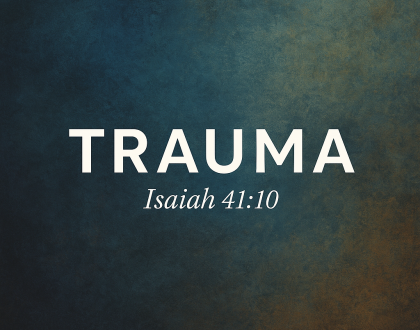Hope in Our Wounds
Last Sunday, we reflected on the timeless reality of trauma and grief, recognizing that the pain we experience today is not unlike what our faith ancestors endured. From Adam and Eve to Jesus himself, the Bible shows us that brokenness and suffering are part of the human story, yet God’s presence never leaves us alone in those moments. We explored how God’s power brings healing even while pain remains, and how the scars we carry can become part of a testimony of hope and resilience. Through it all, God invites us to keep the conversation open—sharing our fears, our questions, and our faith with the One who knows us fully.
As you move through this week, I encourage you to take time in your quiet moments to honestly name your pain and grief before God, just as the psalmist and Job did. Don’t be afraid to bring your questions and anger to God, knowing that God never turns away from you. And if you find yourself still in the waiting of Holy Saturday, hold fast to the truth that healing and hope are coming, even if you cannot see them yet. May you find strength in the scars of Christ and courage to share your story of survival and grace with others.
Psalm 147:3-5
“He heals the brokenhearted and binds up their wounds. He determines the number of the stars and calls them each by name. Great is our Lord and mighty in power; his understanding has no limit.”
Key Scriptures:
Isaiah 41:10
“Fear not, for I am with you; be not dismayed, for I am your God. I will strengthen you, I will help you, I will uphold you with my righteous right hand.”
Genesis 50:20
“You intended to harm me, but God intended it for good to accomplish what is now being done, the saving of many lives.”
Key Takeaways
God’s Presence in the Midst of Trauma: The stories of Scripture show that God is not distant from our pain, but intimately present in it. Even when we feel abandoned or overwhelmed, God’s promise is to be with us, to strengthen and uphold us, just as God was with the Israelites in exile and with Jesus in Gethsemane. Our feelings of isolation do not negate God’s nearness; God’s faithfulness endures through every season of suffering.
Honest Lament is Faithful Prayer: Questioning, lamenting, and expressing anger or confusion to God are not signs of weak faith, but of authentic relationship. The Psalms, Job, and Lamentations model a spirituality that brings every emotion before God, trusting that God knows us completely and welcomes our honesty. In our darkest moments, we are invited to keep the conversation with God alive, even when answers are slow in coming.
Scars as Testimonies of Grace: Healing does not always erase the evidence of pain; sometimes, our scars become the very means by which God’s grace is revealed to others. Jesus showed his wounds to his disciples, and our own stories of survival and restoration can become sources of hope and encouragement for those still in the midst of suffering. God can use what was meant for harm to bring about good, both in our lives and in the lives of others.
Living in the Tension Between Grief and Hope: Much of life is spent in the “Holy Saturday” space—between the trauma of Good Friday and the joy of Resurrection Sunday. It is in this sacred waiting that we learn to hold both sorrow and hope, trusting that God is at work even when we cannot yet see the outcome. This tension is not a sign of spiritual failure, but a place where faith is deepened and refined.
Communion as a Place of Healing and Renewal: The table of the Lord is where we bring our woundedness and receive God’s mercy, love, and understanding most deeply. Here, we remember that Jesus’ body was broken and his blood poured out for us, and that God’s power is able to overcome any evil. Communion nourishes us, renews our spirits, and equips us to share God’s grace with a hurting world.
Questions for Reflection:
The sermon encourages us to bring our woundedness and scars to God, trusting that he can use them for good. Is there a specific wound or scar in your life that you struggle to see as redeemable? What would it look like to offer that to God?
Honest lament and questioning are described as faithful prayer. Why do you think God invites us to bring our anger, confusion, and grief to him, instead of hiding those feelings?
The sermon talks about “living in the tension of Holy Saturday”—the space between heartbreak and hope. What does it mean to live in this tension, and how can it shape our faith?
Communion is described as a place of healing and renewal, where we remember Jesus’ brokenness and love. How does participating in communion help you experience God’s presence in your own pain?
Blessings ~ Pastor Jason
Recommended Posts

Fear Not: Trauma and Faith
May 28, 2025

What is God Up To?
May 22, 2025

The Good That is Yours
December 19, 2024
